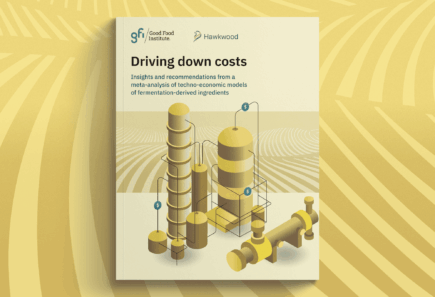
Boosting food supply chain resilience
Using proven biomanufacturing methods like fermentation to produce protein can help ensure a stable food supply during supply chain disruptions.
Save this document
Biotech-enabled food production protects against agricultural threats
The global food system is more fragile than we may like to believe. Potential food supply risks vary from war and trade restrictions to zoonotic disease, extreme weather events, antibiotic resistance, crop failure, and agricultural bioterrorism.
Biomanufacturing—production processes that leverage biological inputs such as plants, animal cells, and microbes—can provide a buffer against sudden food supply shocks. Biomanufacturing is:
- Flexible: Biomanufacturing can leverage a wide variety of feedstocks, from corn to date pits to CO2. Equipment used for biomanufacturing food is transferable to other types of industrial goods, so the same production facility that produces food, fuels, and fibers is able to ramp up and transfer production based on demand.
- Efficient: In contrast with 20-22 weeks for egg-laying hens to produce eggs, ovalbumin protein made via fermentation can be made in about 3 to 8 days from start to finish, once manufacturing capacity comes online. Coconut trees take one year to begin producing fruit, and 70 percent of coconut oil production takes place in only two countries; a standard commercial run for microbial-derived lipid production takes about 4 to 6 days and can take place anywhere in the world.
- Location-neutral: Biomanufacturing can happen anywhere, from the back of a military vehicle to a rural town to the middle of a major city.
- De-risked: Biomanufacturing processes like fermentation have been used for decades to produce pharmaceutical, food, and fuel products, including insulin, enzymes, supplements, and ethanol.
“With biotechnology, platoons will be able to synthesize food, munitions, and therapeutics directly on the front lines using technologies that could fit in a backpack, instead of relying on materials produced thousands of miles away at home. Biotechnology will save lives on the battlefield and prevent the need for costly or dangerous refuel or resupply missions.”
National Security Commission on Emerging Biotechnology Final Report
Related resources

Alternative protein innovation bolsters national security
Alternative protein technologies produce meat with high efficiency, providing fortification for our food system and defense against growing threats.

Techno-economic insights on fermentation ingredients
This report analyzes the competitiveness and key cost drivers of fermentation-derived ingredients, and identifies critical data gaps.

Fermentation manufacturing capacity analysis
This analysis describes the existing fermentation-derived protein manufacturing landscape and strategies to effectively scale manufacturing capabilities to ensure long-term growth.

Key alternative protein policy resources
Learn more about alternative protein policy at the federal and state levels with our suite of resources.
